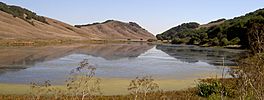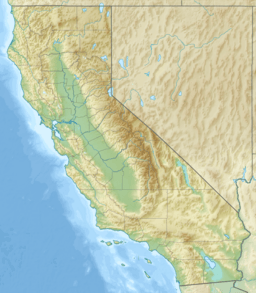Laguna Lake (California) facts for kids
Quick facts for kids Laguna Lake |
|
|---|---|
 |
|
| Location | Sonoma and Marin counties, California |
| Coordinates | 38°12′52″N 122°44′52″W / 38.214363°N 122.747767°W |
| Type | intermittent lake |
| Native name | Spanish: Lago de la Laguna |
| Primary outflows | Chileno Creek |
| Basin countries | United States |
| Max. length | 2 miles (3 km) |
| Max. width | 0.5 miles (1 km) |
| Surface elevation | 226 ft (69 m) |
| Settlements | Petaluma, California |
Laguna Lake is a special natural lake in California. It's found where Sonoma and Marin counties meet. Even though it's called a lake, it's quite shallow and acts a bit like a "vernal pool." This means it might get very full of water during rainy seasons but can shrink a lot when it's dry. Still, it usually keeps some water all year round, making it a home for many animals.
About Laguna Lake
Laguna Lake is a shallow lake located at the start of the Chileno Valley. It is about 0.5 miles (1 km) wide and 2 miles (3 km) long. This makes it a 200-acre body of water. The lake sits right on the border between Sonoma and Marin counties in northern California, United States.
Water Flow
Laguna Lake is the starting point for Chileno Creek. This creek flows about 10 kilometres (6.2 mi) west until it reaches Walker Creek.
History of the Lake
In 1845, Laguna Lake was part of a large piece of land called the Rancho Laguna de San Antonio. This land was given to a person named Bartolomé Bojorquez by the Mexican government. These "land grants" were a way for the government to give out land for people to live on and use.
Wildlife at Laguna Lake
Laguna Lake is a very important place for birds, especially waterfowl. Many different types of birds use the lake for two main reasons:
- They stop there during their long migrations (travels) to rest and find food.
- They also use the lake as a safe place to breed and raise their young.
One special visitor to Laguna Lake in the winter is the whistling swan (Cygnus columbianus). These beautiful white birds come to the lake when it gets colder in other places.
 | William M. Jackson |
 | Juan E. Gilbert |
 | Neil deGrasse Tyson |



